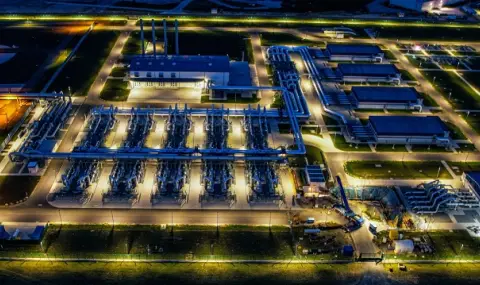An American investor apparently wants to buy the "Nord Stream" gas pipeline in the Baltic Sea, which runs from Russia to Germany. What does this mean in light of the warming relations between the US and Russia, and how will Germany react?
On Wednesday, Russian Foreign Minister Sergei Lavrov confirmed that the restoration of the "Nord Stream" gas pipeline was discussed in the talks on Ukraine with the US. Previously, the German "Handelsblatt" reported that an American investor had applied to the US government to buy the pipeline.
CDU MP Thomas Barais welcomed the idea in a lengthy LinkedIn post, noting "how enterprising our American friends are". "When peace is restored and the guns between Russia and Ukraine fall silent (and let's hope that will happen soon), relations will normalize, the embargo will sooner or later be lifted and, of course, the gas will be able to flow again, perhaps this time in a pipeline under US control," he wrote.
He was supported by Jan Heinisch, a member of the CDU's energy working group in coalition talks with the Social Democratic Party (SPD). "If a just and secure peace is achieved one day, we should be allowed to talk about buying Russian gas again," Heinisch told Politico.
What is "Nord Stream"?
"Nord Stream" is actually two gas pipelines, each with two tubes, that run from northwestern Russia to the northeastern coast of Germany. While Nord Stream 2, completed in 2021, was never put into operation, Nord Stream 1 was opened in 2011 and delivered Russian gas throughout Europe through a consortium including Russia's Gazprom and various German, French and Dutch companies.
Nord Stream 1 was suspended by Russia on September 1, 2022. on the pretext that European Union sanctions had made it technically impossible to keep it in operation (this was denied by the German technology company Siemens, which maintained the turbines). A few weeks later, on September 26, 2022, three of the four Nord Stream pipelines were destroyed in apparent sabotage.
Back in the Russian sphere of influence?
The German economy ministry has until now been under the control of the Greens in Olaf Scholz's coalition government, but that is about to change. In a statement released shortly before the start of March, when rumors of US-Russian discussions first emerged, a spokesman said: "Independence from Russian gas is strategically important for the German government and it will insist on it." But Germany is about to form a new government under the leadership of the CDU. In any case, a possible return to trading in Russian gas would be a U-turn for German policy in recent years. years.
“Alternative for Germany” immediately welcomed Barais' comments. “I am happy that a CDU MP is looking for a way to pursue interest-based politics”, said party co-chairman Tino Krupala. “We need to return to affordable gas supplies from Russia, under the control of our trading partners”.
However, the idea is categorically rejected by energy policy experts in Germany. “I don't think this is a good idea”, says Claudia Kaempfert, head of the energy, transport and environment department at the German Institute for Economic Research. “We have known for a long time that Russia is not a reliable supplier”, she continues. “In view of the global wars over fossil fuels, it would be catastrophic to become dependent on an aggressor again - from a geopolitical point of view, this would be irresponsible. Moreover, a possible Russian-American agreement on "Nord Stream" would effectively put Germany in a double dependency," she adds.
The SPD's ties with Russia
In addition to the right-wing populist AfD, which has openly pro-Russian positions, the German Social Democrats have also advocated close relations with Russia in the past. Former Social Democratic Chancellor Gerhard Schröder, who is a personal friend of Russian President Vladimir Putin, is still on the board of directors of "Nord Stream". In the months following Russia's aggression in Ukraine in February 2022, the SPD came under sharp criticism from the CDU for its old Russian ties and the key role it played in negotiating the "Nord Stream" deal.
In 2022, Merz - then opposition leader - told Deutschlandfunk radio that Germany's energy dependence on Russia must be ended immediately, and called for a parliamentary investigation into the SPD's ties to Russia: He hinted that such an investigation "would probably reveal that the SPD's ties are much deeper than we know today."
Not just political problems, but also environmental ones
Although the reconstruction of the gas pipeline is considered technically feasible - according to preliminary estimates, the cost of this amounts to 500 million dollars - the Swiss-based company “Nord Stream” is currently in bankruptcy negotiations, meaning the pipeline could be sold at a low price.
But any buyer will be counting on a peace deal with Ukraine that would lead to an easing of sanctions against Russia, and on Europe's attempts to switch to renewable energy remaining too slow.
"Fossil gas has no future for us - that much is clear", says expert Kaempfert. "As part of the Paris Agreement, we committed to climate neutrality, which we must achieve. The decision to phase out fossil fuels was taken a long time ago - now we finally have to act".
However, it remains unclear whether there is the political will to implement the energy transition and maintain energy independence from Russia in the future. It seems that at least some members of the next German government are not so categorical.
